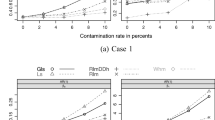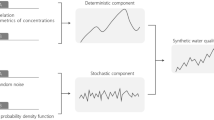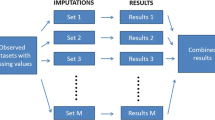Abstract
We introduce robust procedures for analyzing water quality data collected over time. One challenging task in analyzing such data is how to achieve robustness in presence of outliers while maintaining high estimation efficiency so that we can draw valid conclusions and provide useful advices in water management. The robust approach requires specification of a loss function such as the Huber, Tukey’s bisquare and the exponential loss function, and an associated tuning parameter determining the extent of robustness needed. High robustness is at the cost of efficiency loss in parameter loss. To this end, we propose a data-driven method which leads to more efficient parameter estimation. This data-dependent approach allows us to choose a regularization (tuning) parameter that depends on the proportion of “outliers” in the data so that estimation efficiency is maximized. We illustrate the proposed methods using a study on ammonium nitrogen concentrations from two sites in the Huaihe River in China, where the interest is in quantifying the trend in the most recent years while accounting for possible temporal correlations and “irregular” observations in earlier years.







Similar content being viewed by others
References
Birkes, D., & Dodge, Y. (1993). Alternative methods of regression. New York: Wiley.
Venables, W.N., & Ripley, B.D. (2002). Modern applied statistics with S-PLUS, 4th Edn. Springer.
Wang, Y.-G., Lin, X., Zhu, M., Bai, Z. (2007). Robust estimation using the Huber function with a data-dependent tuning constant. Journal of Computational and Graphical Statistics, 16(2), 468–481.
Wang, X., Jiang, Y., Huang, M., Zhang, H. (2013). Robust variable selection with exponential squared loss. Journal of the American Statistical Association, 108, 632–643.
Huber, P.J. (1964). Robust estimation of a location parameter. The Annals of Mathematical Statistics, 35, 73–101.
Schrader, R.M., & Hettmansperger, T.P. (1980). Robust analysis of variance based on upon a likelihood ratio criterion. Biometrika, 67, 93–101.
Wang, J.Z., Chen, T.H., Zhu, C.Z., Peng, S.C. (2014). Trace organic pollutants in sediments from Huaihe River, China: evaluation of sources and ecological risk. Journal of Hydrology, 512, 463–469. https://doi.org/10.1016/j.jhydrol.2014.03.012.
He, T., Lu, Y., Cui, Y., Luo, Y., Wang, M., Meng, W., Zhang, K., Zhao, F. (2015). Detecting gradual and abrupt changes in water quality time series in response to regional payment programs for watershed services in an agricultural area. Journal of Hydrology, 525, 457–471. https://doi.org/10.1016/j.jhydrol.2015.04.005.
Tian, D., Zheng, W., Wei, X., Sun, X., Liu, L., Chen, X., Zhang, H., Zhou, Y., Chen, H., Zhang, H., Wang, X., Zhang, R., Jiang, S., Zheng, Y., Yang, G., Qu, W. (2013). Dissolved microcystins in surface and ground waters in regions with high cancer incidence in the Huai River Basin of China. Chemosphere, 91(7), 1064–71. https://doi.org/10.1016/j.chemosphere.2013.01.051.
Zhang, J.Y., Wang, G.Q., Pagano, T.C., Jin, J.L., Liu, C.S., He, R.M., Liu, Y.L. (2013). Using hydrologic simulation to explore the impacts of climate change on runoff in the Huaihe River Basin of China. Journal of Hydrologic Engineering, 18(11), 1393–1399. https://doi.org/10.1061/(asce)he.1943-5584.0000581.
Wang, Y.-G., Kuhnert, P., Henderson, B. (2011). Load estimation with uncertainties from opportunistic sampling data—a semiparametric approach. Journal of Hydrology, 396(1), 148–157.
Wang, Y.-G., & Tian, T. (2013). Sediment concentration prediction and statistical evaluation for annual load estimation. Journal of Hydrology, 482, 69–78.
Wang, Y.-G., & Lin, X. (2005). Effects of variance-function misspecification in analysis of longitudinal data. Biometrics, 61(2), 413–421.
Wang, Y.-G., & Zhao, Y. (2007). A modified pseudolikelihood approach for analysis of longitudinal data. Biometrics, 63(3), 681–689.
Funding
This research was funded by the Australian Research Council projects (DP130100766 and DP160104292).
Author information
Authors and Affiliations
Corresponding author
Rights and permissions
About this article
Cite this article
Wang, N., Wang, YG., Hu, S. et al. Robust Regression with Data-Dependent Regularization Parameters and Autoregressive Temporal Correlations. Environ Model Assess 23, 779–786 (2018). https://doi.org/10.1007/s10666-018-9605-7
Received:
Accepted:
Published:
Issue Date:
DOI: https://doi.org/10.1007/s10666-018-9605-7




